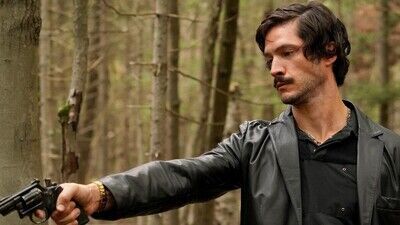Mostly taking place over the course of a year, “Dusk for a Hitman” begins in the Fall of 1979. Lavoie (Éric Bruneau), behind the wheel of his sleek caramel-colored Cadillac, is driving down a country road with a new, nervous partner. His young sidekick was assigned to Lavoie by their boss, Claude Dubois (Benoît Gouin), after the kid messed up a previous hit. Lavoie is accompanying him to finish the job. “Now that you have to help me, you’ll see it’s easy to kill a man,” Lavoie wryly says. The pair proficiently infiltrate the hideout of their target, shooting him in an outhouse. This is only half the task; in the quickness of a breath, Lavoie executes his partner.
Lavoie is Dubois’ best hired gun. The real-life hitman, in fact, would later admit that he murdered fifteen people for the crime boss, who, with his mob boss brother—the film omits the sibling—ruled Montreal’s underworld. Along with killings, Lavoie also collects debts and is an enforcer. Dubois so trusts him that the kingpin even shows the hitman where to find his buried loot in case someone is dumb enough to take him hostage. Outside of the close bond shared by employer and employee, St-Jean and Martin Girard provide little else about this organization’s inner workings. So, if you’re looking for Henry Hill to give a “Goodfellas” explanation of Lavoie’s background and personal thoughts, you won’t find it in this film. That isn’t necessarily a negative. I’d even say it’s by design: Dubois dispatches rats and failures so quickly there’s no sense in learning their names. But I can’t help but feel more world-building could have happened: What’s Dubois’ territory, and how does his business hum?
There’s a similar thinness to Lavoie’s family life. His wife Francine (Rose-Marie Perreault) is so basic she might as well be nonexistent. His young daughter, to the best of my knowledge, doesn’t even have a name. Lavoie mostly calls her the kid. Once again, you get the sense this is by design. Not unlike what Martin Scorsese did with Anna Paquin’s character in “The Irishman.” Lavoie is so consumed by the lifestyle of murder, cocaine, and money—that he barely has the bandwidth or desire to see his family as people worth knowing. But by the second half of the film, when Lavoie’s motivations shift toward protecting his family, there are only two very brief scenes featuring his daughter. It’s a kind of hollowness that, after a while, feels less like a window into the character and more like a severed thread.

